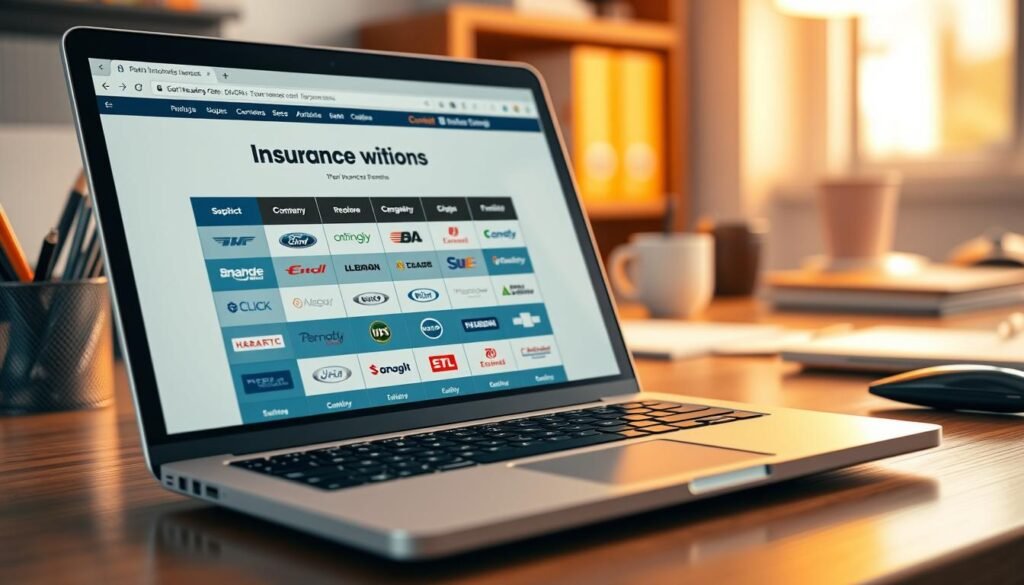Are you paying too much for your auto insurance? The average cost of full coverage is $182 per month. Liability-only insurance costs about $103. This makes it important to find the right coverage for you.
It’s key to make smart choices to avoid overpaying. By comparing different policies, you can find the best car insurance. Knowing what you need and looking at various providers helps you get the right coverage.
Key Takeaways
- Average cost of full coverage auto insurance is $182 per month.
- Liability-only insurance averages $103 per month.
- Comparing policies helps in finding the best auto insurance.
- Informed decisions can save you from overpaying.
- Understanding your needs is crucial for the right coverage.
Understanding Car Insurance Basics
Knowing the basics of car insurance is key to making smart choices. It’s not just a legal must in most places. It’s also a financial shield that guards you against many road risks.
Types of Car Insurance Coverage
There are mainly two kinds of auto insurance: liability and full coverage. Liability coverage is a must in all states except New Hampshire. It pays for damages to others if you’re at fault. Full coverage adds comprehensive and collision, which protect your car. It’s needed for leased or financed cars.
Minimum Requirements by State
Every state has its own car insurance rules. Liability coverage is a must everywhere, except New Hampshire. But, the minimum amounts differ a lot. Some states require coverage for injuries and property damage, while others have more rules. Always check your state’s rules to make sure you’re covered right.
How Premiums Are Calculated
Car insurance costs are based on many things. These include your driving record, age, car type, where you live, and credit score. Insurers use special formulas to figure out how much risk you are. Knowing these can help you find ways to lower your costs.
By learning these basics, you can better understand the car insurance world. Whether you’re searching for the best car insurance or just want to know your options, knowing is power.
Best Car Insurance Companies in the US
Choosing the right car insurance company is important. You need to look at several things. These include the type of coverage, customer service, and how financially stable the company is.
Industry Leaders and Their Strengths
Top car insurance companies like Travelers, Auto-Owners, American Family, State Farm, and USAA are leaders. They offer great coverage and service. Each company has its own strengths:
- Travelers is known for its strong coverage and new tools for managing policies.
- Auto-Owners is praised for its customer satisfaction and wide coverage.
- American Family is known for its personalized service and flexible payment options.
- State Farm is one of the biggest insurers. It offers many coverage options and a large network of agents.
- USAA is highly regarded for its service to military members and their families. It offers competitive rates and wide coverage.
Regional Providers Worth Considering
While big brands are common, regional providers like Amica Mutual and Erie Insurance are also good. They offer local service and competitive prices.
Customer Satisfaction Rankings
Customer satisfaction is key. Studies show that USAA, Amica Mutual, and Auto-Owners are often at the top in customer satisfaction surveys.
Financial Stability Ratings
Financial stability is crucial for an insurance company. Ratings from A.M. Best and Standard & Poor’s help guide your choice. High ratings, like those of State Farm and Travelers, show strong financial health.
When comparing car insurance companies, look at these factors. This will help you find the best fit for your needs. Consider the industry leaders, regional providers, customer satisfaction, and financial stability to make a smart choice.
Factors That Affect Your Car Insurance Rates
Your car insurance rates are not random. They are based on many personal and vehicle factors. Knowing these can help you find ways to lower your costs and get affordable car insurance.
Driving History and Experience
Your driving history is key in setting your rates. A clean record with no accidents or tickets can lower your premiums. But, a history of claims or tickets can raise them. More experienced drivers usually get better rates.
Vehicle Type and Safety Features
The car you drive and its safety features matter a lot. Cars with safety features like anti-lock brakes and airbags get lower premiums. But, high-performance or luxury cars cost more to insure.
Location and Demographics
Where you live and your demographic info also affect your rates. Urban areas have higher rates due to theft and accident risks. Certain ages and genders may also be charged differently.
Credit Score Impact
Your credit score is another factor. Good credit scores mean lower rates because you’re seen as more responsible. Keeping a good credit score can help lower your car insurance quotes.
Understanding these factors can help you lower your rates. This way, you can find a more affordable policy that fits your needs.
How to Compare Car Insurance Quotes Effectively
Finding the right car insurance starts with comparing quotes. There are many providers with different policies. It’s key to know how to compare these quotes well.
Online Comparison Tools
Online tools like Insurify have changed how we compare car insurance quotes. They let you input your info once and get quotes from many insurers. This makes it simpler to find cheap car insurance that fits your needs.
Working with Independent Agents
Independent agents offer personalized advice. They help you understand car insurance policies better. They can guide you to the best car insurance coverage for you.

Questions to Ask When Comparing Policies
When comparing quotes, ask the right questions. Ask about coverage limits, deductibles, and extra features. This helps you make a smart choice and get the best value.
Reading the Fine Print
Reading the fine print is crucial when comparing policies. Know what’s covered and what’s not. Also, understand any conditions that might apply. This prevents surprises when you file a claim.
| Comparison Factor | Insurer A | Insurer B |
|---|---|---|
| Premium Cost | $150/month | $120/month |
| Coverage Limit | $100,000 | $500,000 |
| Deductible | $500 | $1000 |
Strategies for Finding Affordable Car Insurance
You can lower your car insurance costs by using a few smart strategies. To make insurance more affordable, look for ways to save money. There are many options to explore.
Discount Opportunities You Shouldn’t Miss
Many insurance companies offer discounts that can lower your premiums a lot. These discounts are for safe driving, being a good student, or having safety features in your car. Always ask about discounts when you compare insurance quotes.
Bundling Insurance Policies
Combining your car insurance with other policies, like home or life insurance, can save money. This makes managing your insurance easier and can help you save.
Adjusting Coverage and Deductibles
Changing your coverage levels and deductibles can also affect your premiums. Choosing a higher deductible can lower your premiums. But make sure you can pay the deductible if you need to.
Usage-Based Insurance Options
Usage-based insurance (UBI) programs track your driving habits. They offer discounts for safe driving. If you drive safely, UBI could be a good choice for you.
| Strategy | Potential Savings | Key Considerations |
|---|---|---|
| Discounts | Up to 20% off premiums | Ask about available discounts when comparing quotes |
| Bundling Policies | 5-15% discount | Simplify insurance management by bundling policies |
| Adjusting Deductibles | Varies based on deductible change | Ensure you can afford the deductible in case of a claim |
| Usage-Based Insurance | Up to 30% off for safe driving | Monitor your driving habits and adjust accordingly |
Conclusion: Making an Informed Car Insurance Decision
Now that you know the basics of car insurance, it’s time to use this knowledge. Understanding car insurance, comparing quotes, and finding affordable options are key. To get the best deal, shop around and compare rates from different companies.
Use online tools to compare car insurance quotes. This will help you find the policy that fits your budget best.
Remember, your driving history, vehicle type, and location affect your rates. Changing your coverage and deductibles can also save you money. Being informed and proactive means you can drive with confidence, knowing you’re covered.


